Terasic DE1-SoC Board
Terasic DE1-SoC Board
(P/N:P0159)
The DE1-SoC Development Kit presents a robust hardware design Description built around the Altera System-on-Chip (SoC) FPGA, which combines the latest dual-core Cortex-A9 embedded cores with industry-leading programmable logic for ultimate design flexibility. Users can now leverage the power of tremendous re-configurability paired with a high-performance, low-power processor system. Altera’s SoC integrates an ARM-based hard processor system (HPS) consisting of processor, peripherals and memory interfaces tied seamlessly with the FPGA fabric using a high-bandwidth interconnect backbone. The DE1-SoC development board includes hardware such as high-speed DDR3 memory, video and audio capabilities, Ethernet networking, and much more. The DE1-SOC Development Kit contains all components needed to use the board in conjunction with a computer that runs the Microsoft Windows XP or later ( 64-bit OS and Quartus II 64-bit are required to compile projects for DE1-SoC ).
Board Comparisons
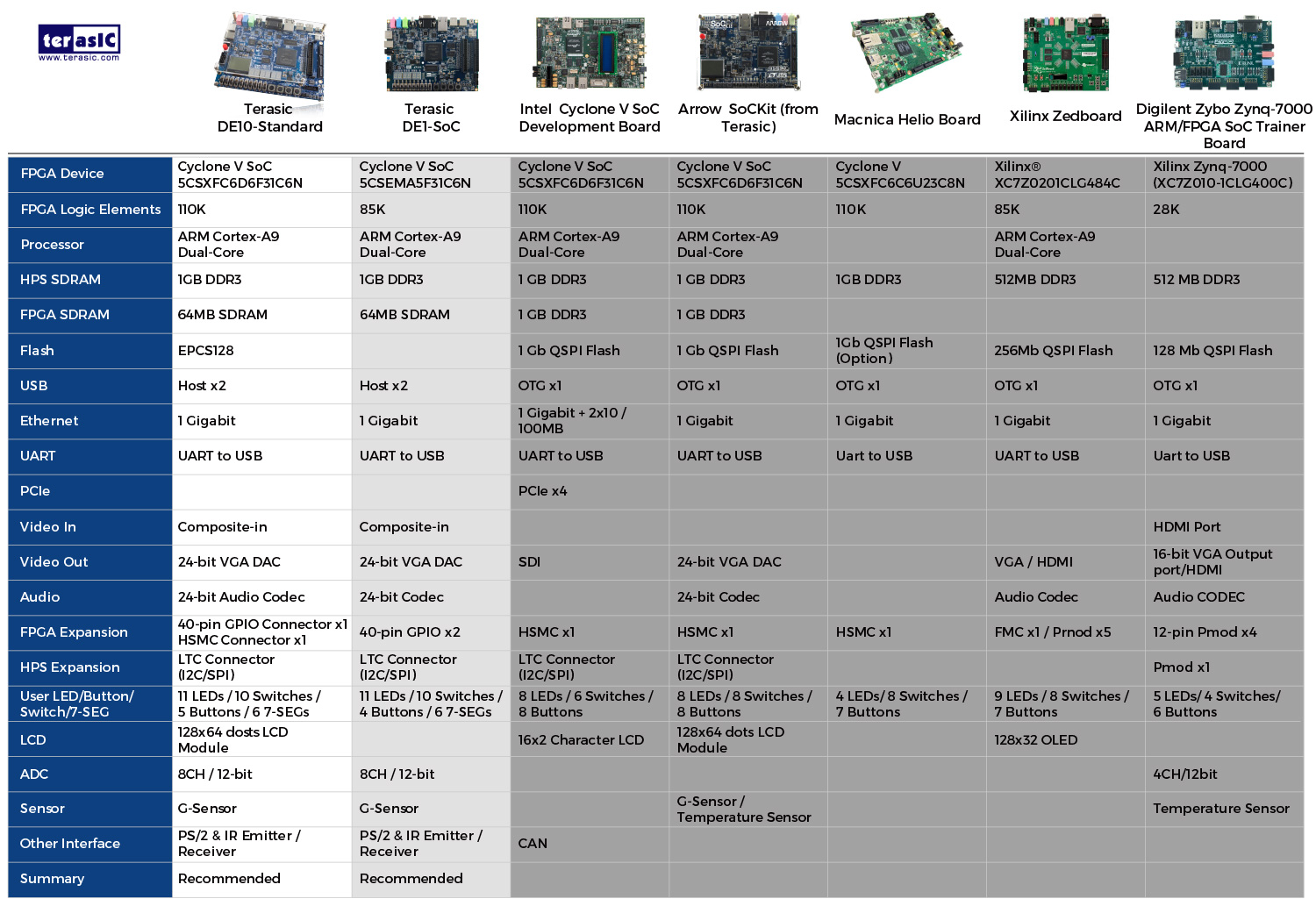
Specification
The DE1-SoC board has many features that allow users to implement a wide range of designed circuits, from simple circuits to various multimedia projects.
The following hardware is provided on the board:
FPGA Device
- Cyclone V SoC 5CSEMA5F31C6 Device
- Dual-core ARM Cortex-A9 (HPS)
- 85K Programmable Logic Elements
- 4,450 Kbits embedded memory
- 6 Fractional PLLs
- 2 Hard Memory Controllers
Configuration and Debug
- Serial Configuration Device – EPCS128 on FPGA
- On-Board USB Blaster II (Normal Type B USB Connector)
Memory Device
- 64MB (32Mx16) SDRAM on FPGA
- 1GB (2x256Mx16) DDR3 SDRAM on HPS
- Micro SD Card Socket on HPS
Communication
- Two USB 2.0 Host Ports (ULPI interface with USB type A connector) on HPS
- UART to USB (USB Mini B connector)
- 10/100/1000 Ethernet
- PS/2 mouse/keyboard
- IR Emitter/Receiver
Connectors
- Two 40-pin Expansion Headers (voltage levels: 3.3V)
- One 10-pin ADC Input Header
- One LTC connector
(One Serial Peripheral Interface (SPI) Master, one I2C, and one GPIO interface)
Display
- 24-bit VGA DAC
Audio
- 24-bit CODEC, Line-in, line-out, and microphone-in jacks
Video Input
- TV Decoder (NTSC/PAL/SECAM) and TV-in connector
ADC
- Sample rate: 500 KSPS
- Channel number: 8
- Resolution: 12 bits
- Analog input range: 0 ~ 4.096 V
Switches, Buttons and Indicators
- 4 User Keys (FPGA x4)
- 10 User switches (FPGA x10)
- 11 User LEDs (FPGA x10 ; HPS x1)
- 2 HPS Reset Buttons (HPS_RST_n and HPS_WARM_RST_n)
- Six 7-segment displays
Sensors
- G-Sensor on HPS
Power
- 12V DC input
Block Diagram of the DE1-SOC Board
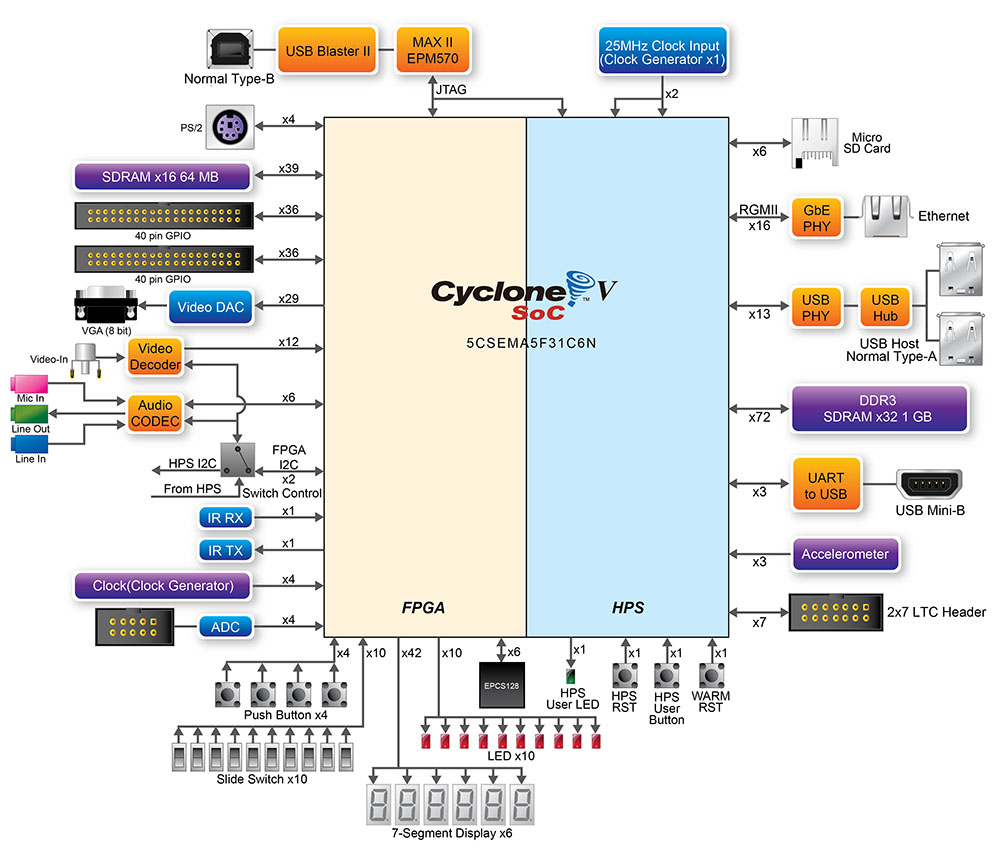
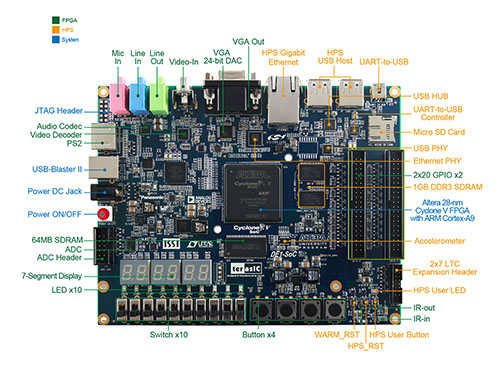
DE1-SoC Board Top-view
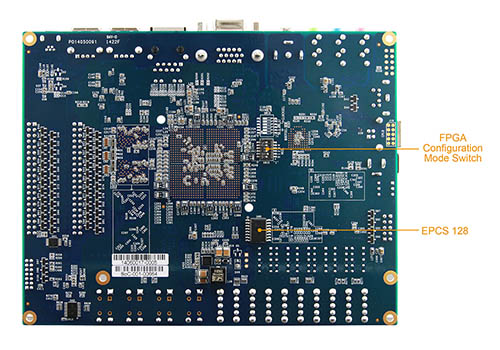
DE1-SoC Board Bottom-view
Package Include
- DE1-SoC Board
- DE1-SoC Quick Start Guide
- Type A to B USB Cable
- Type A to Mini-B USB Cable
- Power DC Adapter (12V)
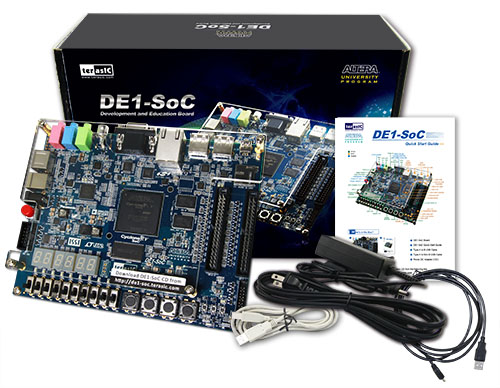
CD-ROM (64-bit OS and Quartus II 64-bit are required to compile projects)
BSP(Board Support Package) for Altera SDK OpenCL 18.1
| Title | Version | Description | Date | Download |
|---|---|---|---|---|
| DE1-SoC OpenCL BSP(.zip) | 1.0 | Linux Kernel:3.10 | 2020-08-03 | |
| DE1-SoC OpenCL BSP(.tar.gz) | 1.0 | Kernel:3.10 | 2020-08-03 | |
| DE1-SoC OpenCL User Manual | 05 | 2020-08-03 |
BSP(Board Support Package) for Altera SDK OpenCL 16.0
| Title | Version | Description | Date | Download |
|---|---|---|---|---|
| DE1-SoC OpenCL BSP V1.1(.zip) | 1.0 | Linux Kernel:3.10 | 2017-03-28 | |
| DE1-SoC OpenCL User Manual | 02 | 2014-11-28 |
BSP(Board Support Package) for Altera SDK OpenCL 14.0
| Title | Version | Description | Date | Download |
|---|---|---|---|---|
| DE1-SoC OpenCL BSP(.zip) | 1.0 | Linux Kernel:3.12 | 2015-01-28 | |
| DE1-SoC OpenCL BSP(.tar.gz) | 1.0 | 2015-01-28 | ||
| DE1-SoC OpenCL User Manual | 02 | Linux Kernel:3.12 | 2014-11-28 |
Linux BSP (Board Support Package): MicroSD Card Image
Demonstration
| Title | Version | Size | Date | Download |
|---|---|---|---|---|
| Download source code of VIP Demonstration Guide | 2020-11-26 | |||
| Download source code of VIP Demonstration | 2014-02-25 |
More resources about IP and Dev. Kit are available on Intel User Forums.


